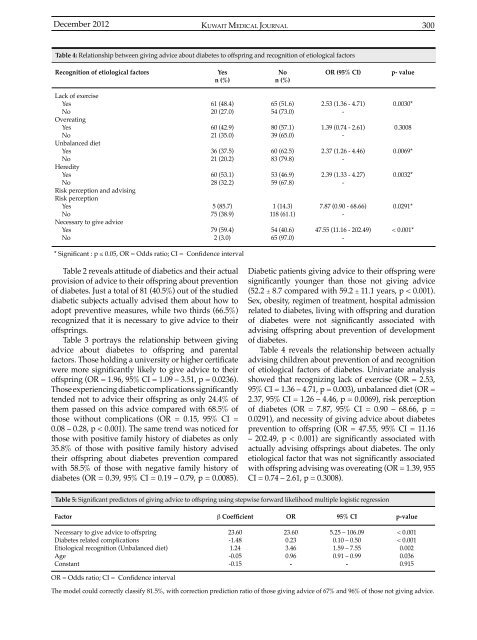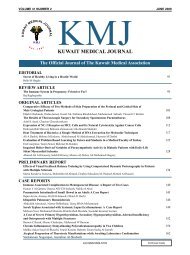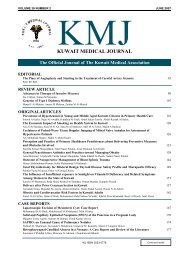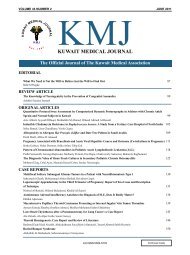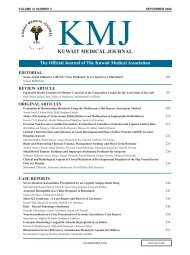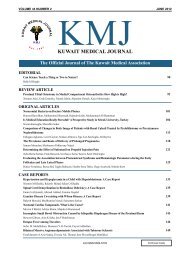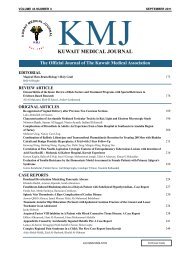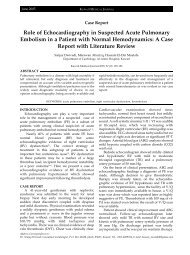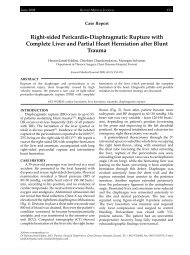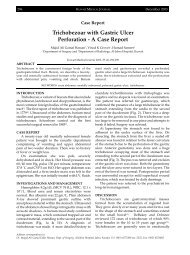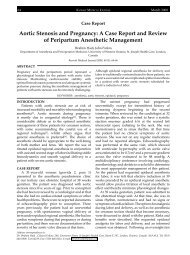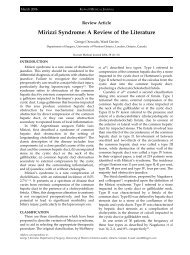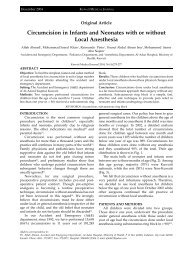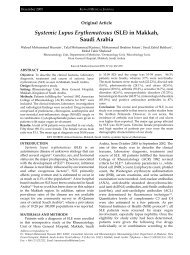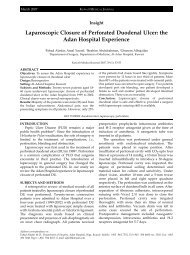Vol 44 # 4 December 2012 - Kma.org.kw
Vol 44 # 4 December 2012 - Kma.org.kw
Vol 44 # 4 December 2012 - Kma.org.kw
You also want an ePaper? Increase the reach of your titles
YUMPU automatically turns print PDFs into web optimized ePapers that Google loves.
<strong>December</strong> <strong>2012</strong><br />
KUWAIT MEDICAL JOURNAL 300<br />
Table 4: Relationship between giving advice about diabetes to offspring and recognition of etiological factors<br />
Recognition of etiological factors<br />
Yes<br />
n (%)<br />
No<br />
n (%)<br />
OR (95% CI)<br />
p- value<br />
Lack of exercise<br />
Yes<br />
No<br />
Overeating<br />
Yes<br />
No<br />
Unbalanced diet<br />
Yes<br />
No<br />
Heredity<br />
Yes<br />
No<br />
Risk perception and advising<br />
Risk perception<br />
Yes<br />
No<br />
Necessary to give advice<br />
Yes<br />
No<br />
61 (48.4)<br />
20 (27.0)<br />
60 (42.9)<br />
21 (35.0)<br />
36 (37.5)<br />
21 (20.2)<br />
60 (53.1)<br />
28 (32.2)<br />
5 (85.7)<br />
75 (38.9)<br />
79 (59.4)<br />
2 (3.0)<br />
65 (51.6)<br />
54 (73.0)<br />
80 (57.1)<br />
39 (65.0)<br />
60 (62.5)<br />
83 (79.8)<br />
53 (46.9)<br />
59 (67.8)<br />
1 (14.3)<br />
118 (61.1)<br />
54 (40.6)<br />
65 (97.0)<br />
2.53 (1.36 - 4.71)<br />
-<br />
1.39 (0.74 - 2.61)<br />
-<br />
2.37 (1.26 - 4.46)<br />
-<br />
2.39 (1.33 - 4.27)<br />
-<br />
7.87 (0.90 - 68.66)<br />
-<br />
47.55 (11.16 - 202.49)<br />
-<br />
0.0030*<br />
0.3008<br />
0.0069*<br />
0.0032*<br />
0.0291*<br />
< 0.001*<br />
* Significant : p ≤ 0.05, OR = Odds ratio; CI = Confidence interval<br />
Table 2 reveals attitude of diabetics and their actual<br />
provision of advice to their offspring about prevention<br />
of diabetes. Just a total of 81 (40.5%) out of the studied<br />
diabetic subjects actually advised them about how to<br />
adopt preventive measures, while two thirds (66.5%)<br />
recognized that it is necessary to give advice to their<br />
offsprings.<br />
Table 3 portrays the relationship between giving<br />
advice about diabetes to offspring and parental<br />
factors. Those holding a university or higher certificate<br />
were more significantly likely to give advice to their<br />
offspring (OR = 1.96, 95% CI = 1.09 – 3.51, p = 0.0236).<br />
Those experiencing diabetic complications significantly<br />
tended not to advice their offspring as only 24.4% of<br />
them passed on this advice compared with 68.5% of<br />
those without complications (OR = 0.15, 95% CI =<br />
0.08 – 0.28, p < 0.001). The same trend was noticed for<br />
those with positive family history of diabetes as only<br />
35.8% of those with positive family history advised<br />
their offspring about diabetes prevention compared<br />
with 58.5% of those with negative family history of<br />
diabetes (OR = 0.39, 95% CI = 0.19 – 0.79, p = 0.0085).<br />
Diabetic patients giving advice to their offspring were<br />
significantly younger than those not giving advice<br />
(52.2 ± 8.7 compared with 59.2 ± 11.1 years, p < 0.001).<br />
Sex, obesity, regimen of treatment, hospital admission<br />
related to diabetes, living with offspring and duration<br />
of diabetes were not significantly associated with<br />
advising offspring about prevention of development<br />
of diabetes.<br />
Table 4 reveals the relationship between actually<br />
advising children about prevention of and recognition<br />
of etiological factors of diabetes. Univariate analysis<br />
showed that recognizing lack of exercise (OR = 2.53,<br />
95% CI = 1.36 – 4.71, p = 0.003), unbalanced diet (OR =<br />
2.37, 95% CI = 1.26 – 4.46, p = 0.0069), risk perception<br />
of diabetes (OR = 7.87, 95% CI = 0.90 – 68.66, p =<br />
0.0291), and necessity of giving advice about diabetes<br />
prevention to offspring (OR = 47.55, 95% CI = 11.16<br />
– 202.49, p < 0.001) are significantly associated with<br />
actually advising offsprings about diabetes. The only<br />
etiological factor that was not significantly associated<br />
with offspring advising was overeating (OR = 1.39, 955<br />
CI = 0.74 – 2.61, p = 0.3008).<br />
Table 5: Significant predictors of giving advice to offspring using stepwise forward likelihood multiple logistic regression<br />
Factor<br />
β Coefficient<br />
OR<br />
95% CI<br />
p-value<br />
Necessary to give advice to offspring<br />
Diabetes related complications<br />
Etiological recognition (Unbalanced diet)<br />
Age<br />
Constant<br />
23.60<br />
-1.48<br />
1.24<br />
-0.05<br />
-0.15<br />
23.60<br />
0.23<br />
3.46<br />
0.96<br />
-<br />
5.25 – 106.09<br />
0.10 – 0.50<br />
1.59 – 7.55<br />
0.91 – 0.99<br />
-<br />
< 0.001<br />
< 0.001<br />
0.002<br />
0.036<br />
0.915<br />
OR = Odds ratio; CI = Confidence interval<br />
The model could correctly classify 81.5%, with correction prediction ratio of those giving advice of 67% and 96% of those not giving advice.


